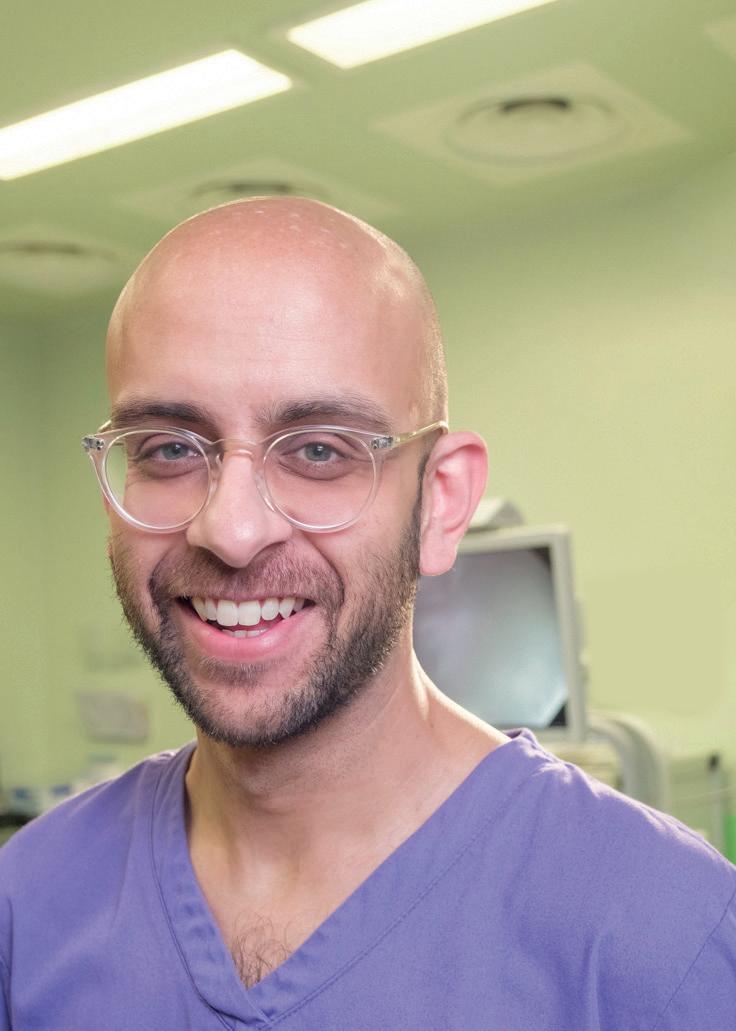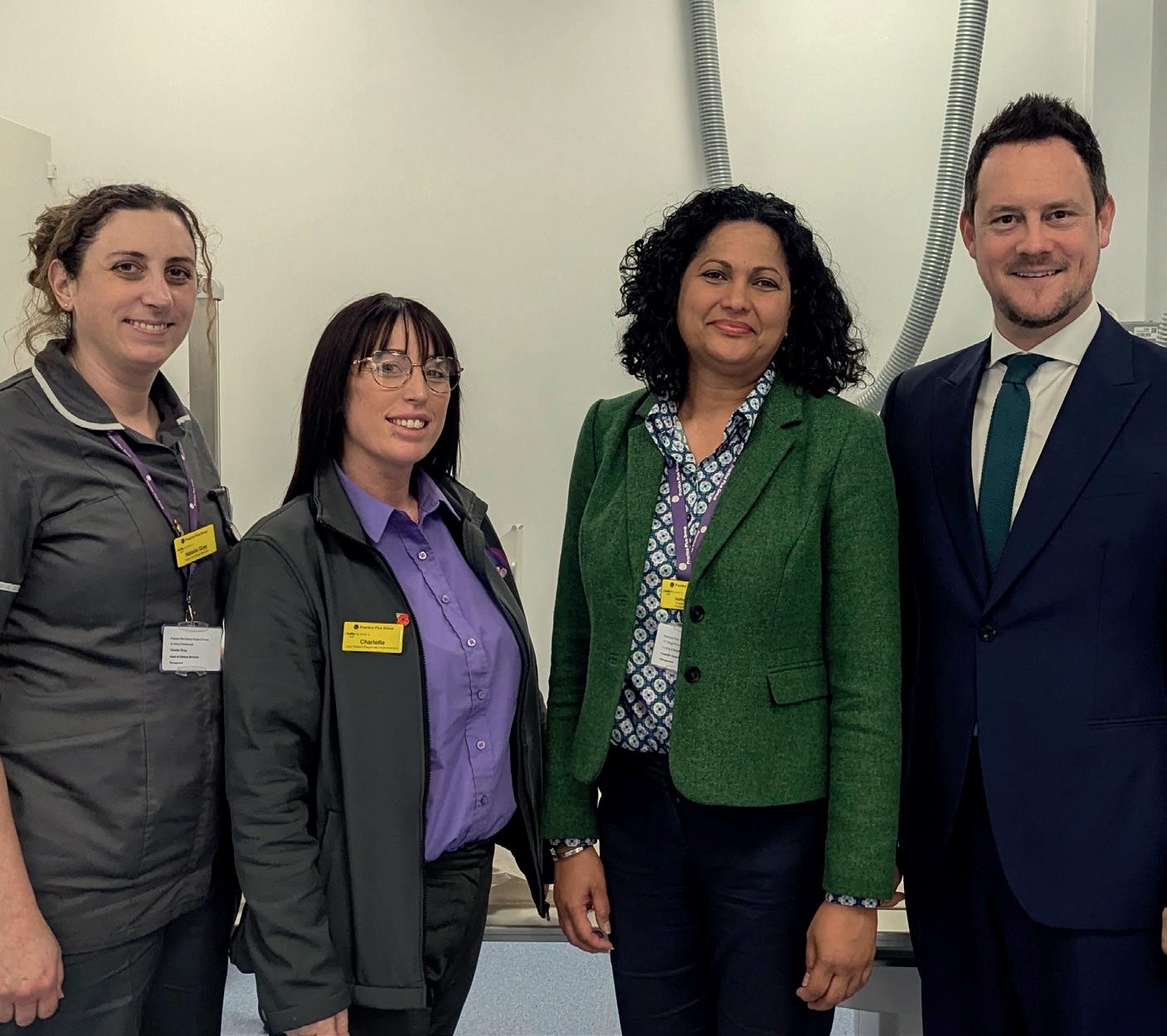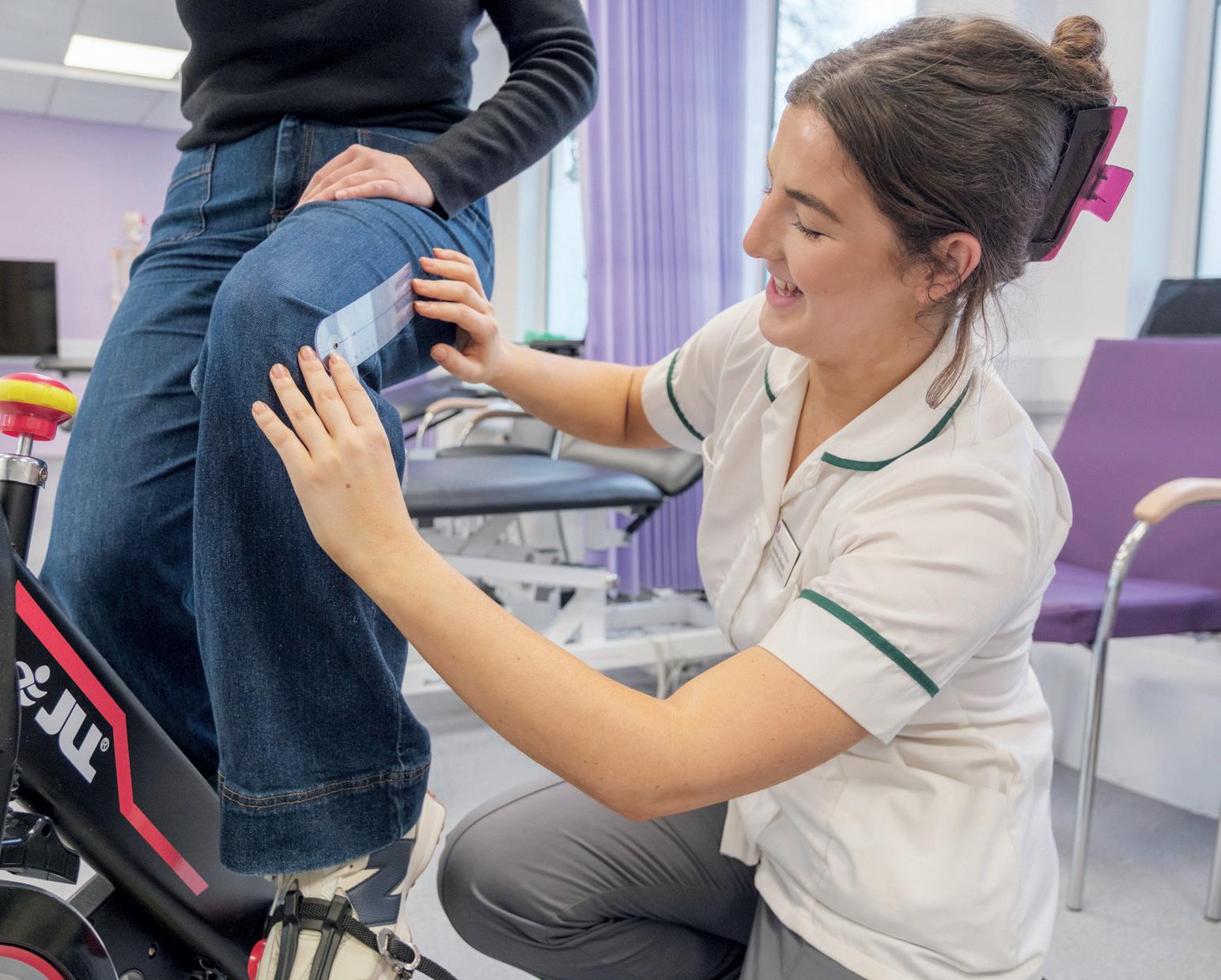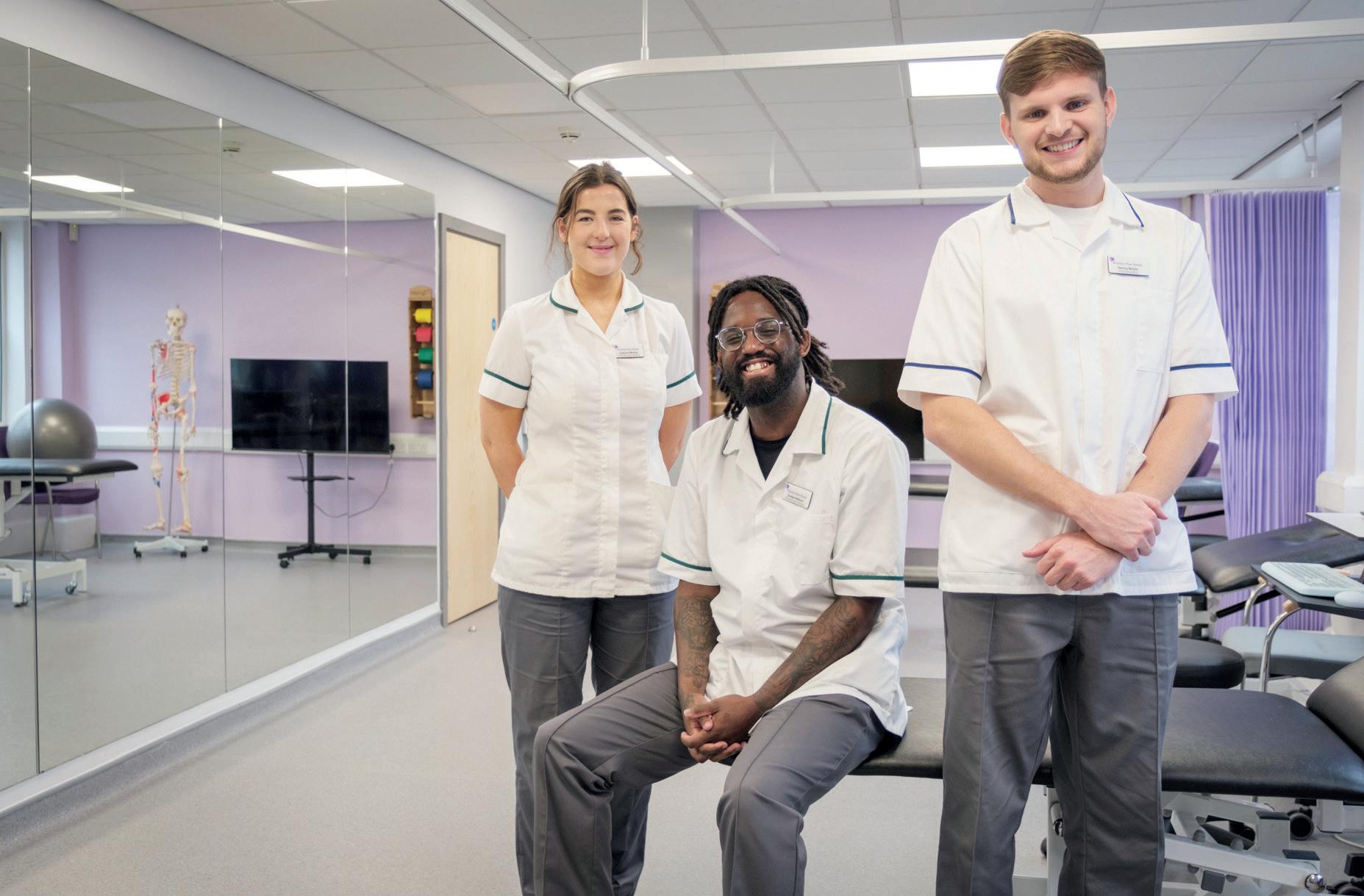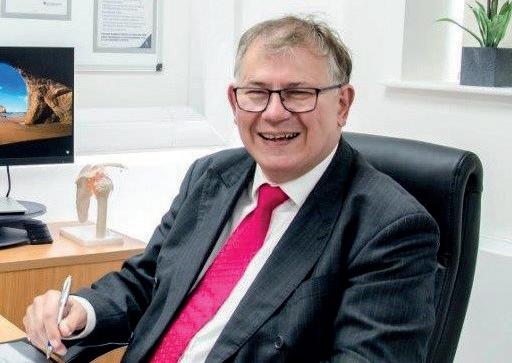HELPING REDUCE NHS WAITS
A partnership between the NHS in Cornwall and the Isles of Scilly and Practice Plus Group Hospital, Plymouth, has been hailed as an example of how giving NHS patients more choices over where they have their surgery can reduce waiting times.
Over 1400 patients on NHS waiting lists in Cornwall have been called and offered the option of having their surgery elsewhere, including at private hospitals.
Over 750 people agreed and are now on the mend having had their operations. Many of these are hip and knee replacements, as these routine
but life-changing procedures are amongst those most badly affected by long waiting lists since COVID.
Sarah-Jane Fell, Hospital Director at Practice Plus Group Hospital, Plymouth, said: “We are proud to have operated on over 270 patients from Cornwall who had already been waiting over a year when they were referred to us. We speak to every person who chooses us
and explain that although we are a private hospital and offer private surgery, we are also a trusted NHS provider and that they could be seen sooner with us, at no charge.”
The government has committed to empowering patients to have more options over where to have their surgery, and to using private hospitals like ours to help more people access the help they need.
Endoscopy was particularly impacted by COVID restrictions and has struggled to catch up, with more than 2.5 million people on waiting lists for an endoscopy across the NHS.
Here at Practice Plus Group, however, we offer endoscopy across many of our sites and NHS patients who ask their GP for a referral to one of our hospitals will usually find much shorter waiting times than at large NHS hospitals. Patients who have medical insurance or who want to pay for themselves can also access endoscopies with us.
Aside from our short waits, what sets us apart from other private hospital groups is that every site we provide endoscopy at has achieved the highest external accreditation via the UK national endoscopy body, the Joint Advisory Group on GI Endoscopy (JAG). JAG accreditation is a marker of quality, safety and patient outcomes and our services around the country operate at the highest national standard.
All of our endoscopy procedures are performed by accredited endoscopists who may be consultants in gastroenterology or general surgery, or by nurse endoscopists who have undergone extensive additional training.
Our Ilford, Greater London hospital and its sister surgical centre in Gillingham, Kent, are beacons of outstanding endoscopy practice.
In this special feature, we turn the lens on the team that are usually behind the camera.
Dr Mehtan Ahmed, Gastroenterology Consultant, works closely with Mr Murthy Nyasavajjala, Clinical Director for Endoscopy, Nurse Endoscopist Ferdie Aurea, and a small team of employed consultants and nurses.
“Practice Plus Group can see people on the NHS in a matter of weeks, where in large NHS hospitals you’d be looking at eight to 10 months”
Mehtan says: “The backlog for endoscopy procedures is one of the biggest, but Practice Plus Group can see people on the NHS in a matter of weeks, where in large NHS hospitals you’d be looking at eight to 10 months. This makes a huge
What is an endoscopy for?
An endoscopy can be used to investigate or monitor conditions affecting the oesophagus/gullet (food pipe), stomach, upper small bowel and separately the colon and rectum.
At Practice Plus Group, we offer three types of endoscopy procedure:
• Colonoscopy.
• Flexible sigmoidoscopy.
• Gastroscopy (OGD) or upper GI endoscopy.
An endoscopy can detect issues in several parts of the body, including:
• Digestive system – digestive tract, bowel, esophagus stomach and duodenum.
• Respiratory system – bronchial tubes and lungs.
• Urinary system – bladder.
• Reproductive system – uterus, cervix and prostate.
• ENT – nasal passage, sinuses and throat.
• Joints.
difference to people who want their symptoms to be diagnosed so they can start on whatever treatment they may need as soon as possible, or who want peace of mind that there’s nothing else happening that would explain their symptoms.
He explains: “Upper GI endoscopy is where we look at the oesophagus, stomach and upper small bowel. Most patients in need of one of these procedures would typically be suffering with symptoms such as reflux, heartburn, abdominal pain, nausea, vomiting, or difficulty swallowing. The types of conditions we can help diagnose include gastroesophageal reflux disease (GERD), ulcers, coeliac disease, Barrett’s oesophagus, and iron deficiency anaemia.”
Ferdie Aurea, Nurse Endoscopist, specialises in lower GIs, which encompass colonoscopies and flexible sigmoidoscopies.
He says: “For the ‘lowers’ we see people with changes in their stools and bowel habits, weight loss, or bleeding from the back passage. If someone’s GP suspects cancer they would refer into the NHS on a two-week urgent pathway – but we do sometimes find cancers, and have an open pathway in place with Medway, East Kent and Maidstone hospitals to help manage these.
Symptoms that you might need an endoscopy to diagnose:
• If you are having difficulty swallowing (dysphagia).
• Tummy pain that does not go away or keeps on coming back.
• Diarrhoea and feeling or being sick often.
• Unintentional weight loss.
• Regularly experiencing heartburn or indigestion.
• Blood in your stool.
“Having an endoscopy can make people feel quite anxious as they don’t know what to expect and it can feel quite daunting. We pride ourselves on actually making it a positive experience for our patients and reducing those pre-procedure anxieties. I really champion every effort to alleviate those worries, and we get very positive feedback as a result.”
Also setting Ilford and Gillingham apart is their capacity to train future endoscopists, having been awarded JAG training centre status.
Mehtan explained: “In the NHS it’s a struggle to find dedicated training time, whereas we have the skillset, the physical space and the time in our schedule to train someone up to become a fully-fledged endoscopist. I certainly wish I had had this provision when I was training.”
Ferdie recently undertook training under Mehtan’s supervision and completed a course in non-medical prescribing. He runs a list of patients two days a week in Gillingham as well as pre-assessment clinics, histology reviews and triaging.
What to expect from an endoscopy Before
• Make sure your doctor is aware of any medical conditions you have and don’t be afraid to ask them any questions you may have.
• Doctors may ask you to avoid eating and drinking for several hours before your endoscopy, to avoid any complications.
• Depending on the type of procedure you are having, you may need to be given laxatives to use the night before your procedure to help clear up your bowels. You may also be asked to eat a low-fibre diet for a few days beforehand.
• Some patients may have to take antibiotics to help avoid infections. Also, if you take medicines such as warfarin or clopidogrel that thins your blood, you may need to stop taking it for a few days to avoid running the risk of bleeding during the procedure.
On the day
• Wear comfortable clothes that are not too tight.
• Arrange how you’re going to get home in case you’re feeling uncomfortable afterwards or if the procedure requires you to have sedatives.
• Plan enough time to recover after your operation in case you feel any discomfort.
• The procedure usually takes place when you’re awake. You may be given a local anaesthetic to numb a specific part of your body or offered a sedative to help you relax and make you less aware of what is going on.
• The procedure will begin with the endoscope carefully put into your body and can take 15 – 45 minutes. You can usually go home the same day and do not need to stay overnight in hospital.
Practice Plus Group Endoscopy
Lead, Mr Murthy Nyasavajjala says: “We are proud of Ferdie who champions nurse endoscopy. We would like to have more nurse endoscopists amongst our ranks at our other hospitals including Shepton Mallet, Portsmouth and Birmingham in due course. I believe training centres like ours will be necessary in the future or there will be no endoscopists. There is already a national shortage and this is one of the ways we can support the NHS – not only by seeing NHS patients in weeks, not months, but by developing a pipeline of specialists to treat NHS patients.”
“We pride ourselves on actually making it a positive experience for our patients and reducing those pre-procedure anxieties.”
Looking ahead to what’s next in endoscopy, Murthy says: “For upper GIs, the endoscope usually goes in through the mouth. We are planning to change this in Ilford and Gillingham and to perform the procedure through the nose, which is generally better tolerated by patients, is more comfortable, doesn’t require sedation and is easier for patients. We are always looking for ways to provide the best possible service to our patients.”
How to choose Practice Plus Group for endoscopy:
If you would like to come to us as an NHS patient, ask your GP to refer you to one of our hospitals that offers endoscopy: Practice Plus Group hospitals in Ilford, Plymouth, Birmingham, Southampton, Emersons Green or Shepton Mallet or Practice Plus Group surgical centres at Gillingham, Devizes, and St Mary’s Portsmouth. You can also book a private endoscopy by calling our Wellsoon team on 03330 606 294
The endoscopy team in theatre
total hip or knee replacement, to operations on the hands, feet and ankles.
We tailor treatment as much as possible to give people exercises they need to do and milestones to aim for.
We have two physiotherapists, Henry Boyle and Amara Bashir, and two assistants, Isabel Moody and Jordan Nelson. As the hospital gets busier and busier the team will grow with it.
What does your typical day look like?
We run an in-person joint school every week, to help patients prepare physically and mentally for joint replacement surgery.
It really helps get the best possible outcomes for them after surgery. People who live further away can join online if they prefer.
After a patient has had surgery, we aim to get them up and moving on the same day as the sooner they’re up and moving, the better their outcome.
We aim to discharge patients the next day for the same reason. Lying in a hospital bed isn’t the best recovery for a new joint. We’ll have a ward meeting in the morning and then go and speak to patients, make sure they’re happy to mobilise
and then we aim to discharge people on crutches.
Everybody thinks physiotherapy’s aim is to reduce pain. It isn’t. That’s a consequence of getting people back to doing the things they love, as soon as possible.
The physiotherapy team in Birmingham
EXPERT Q&A
Varicose veins in the legs can cause discomfort and impact self-confidence – especially in spring or summer when you want to wear shorts or skirts, or when playing sports. However, there is a fix for these bulging, unsightly veins. Practice Plus Group now offers this treatment at our Emersons Green, Devizes and Shepton Mallet hospitals. We spoke to Consultant Vascular Surgeon and Medical Director at our Emersons Green hospital, Mr Charles Ranaboldo, about all things veins…
Q What causes varicose veins?
A Simply put, it happens when the valves in your veins that are meant to stop blood flowing down towards your feet, don’t function properly. This causes a high-pressure system which allows blood to flow in the wrong direction, stretching the vessels which become fatter and longer. The appearance of the vessels can then look very lumpy and bulging.
It can happen if those valves haven’t formed properly or have been stretched, for example by pregnancy, or age. While they usually affect people in mid-life, I have treated teenagers, while my oldest patient was 96 with a leg ulcer!
Q Are they serious?
A Swollen veins can cause discomfort, aching and
be fatal. Another reason for more urgent surgery is if leg ulcers have formed or veins begin to bleed.
Q How important is it to get surgery for varicose veins?
A Unless the veins are a threat to health, they are seen as a bit of an inconvenience. However, bulging veins can seriously affect someone’s confidence as they can be quite unsightly. I’ve also treated many people who initially wanted surgery for cosmetic reasons and only realised afterwards how uncomfortable they had actually been after they had been treated. Treatment is relatively straightforward and can be done in a day as an outpatient.
Q How are varicose veins treated?
they are minimally invasive and cause limited scarring.
Q What happens after surgery?
A We recommend patients wear a surgical stocking for a couple of weeks – this helps with recovery and protects against blood clots. People generally recover quickly and can go about their day to day lives again within a few days. Short haul flying is also possible from around a month after – which is good news for many patients as having more confidence on holidays is a key motivation for treatment.
Q Can varicose veins come back after treatment?
a feeling of heaviness or throbbing, though they’re rarely life-threatening. Most people choose to have their varicose veins treated because of their appearance, or because they impact their lives in some way. For example, they can cause night cramps and affect sleep, or can be painful if knocked. Trauma from, say, dishwasher doors, or by a child accidentally catching granny’s ankles with the supermarket trolley can trigger the formation of a leg ulcer driven by varicose veins. More significant complications in the veins – and urgent reasons for surgery - are thrombosis (blood clotting) which can trigger deep venous thrombosis (DVT) and pulmonary embolus (PE). This is very serious and can
A Treatments range from injections, laser surgery or micro incision techniques to reduce the appearance of the veins. We assess the veins using a Doppler test and an ultrasound scanner. Commonly, treatment is undertaken under local anaesthetic using a keyhole laser system placed inside the vein to remove the cause of the offending bulgy veins, which may need to be removed via small incisions. Additionally, we offer injections to tidy up any residual veins. There is a very low-risk of infection in these treatments as
Find out more
A Yes but the chance of your veins coming back in the same system is low. If you get them treated with the endovenous laser the risk of recurrence is only 3%.
Q Can they be treated on the NHS?
A There’s a decline in NHS treatment available for varicose veins mostly because they are not seen as a significant risk to health and in many areas, funding has been cut. It’s always worth asking your GP if you can be referred for treatment, which may be available for leg ulcers, bleeding and clots. It’s increasingly common for people to seek private treatment.
Varicose vein treatment is available with Wellsoon private healthcare from Practice Plus Group. If you want to pay for yourself or use private health insurance, call our UK-based private patient centre to chat about your options today: 0330 029 5522
You can also ask your GP for a referral to Practice Plus Group Hospital, Emersons Green, near Bristol, Devizes or Shepton Mallet, Somerset.
